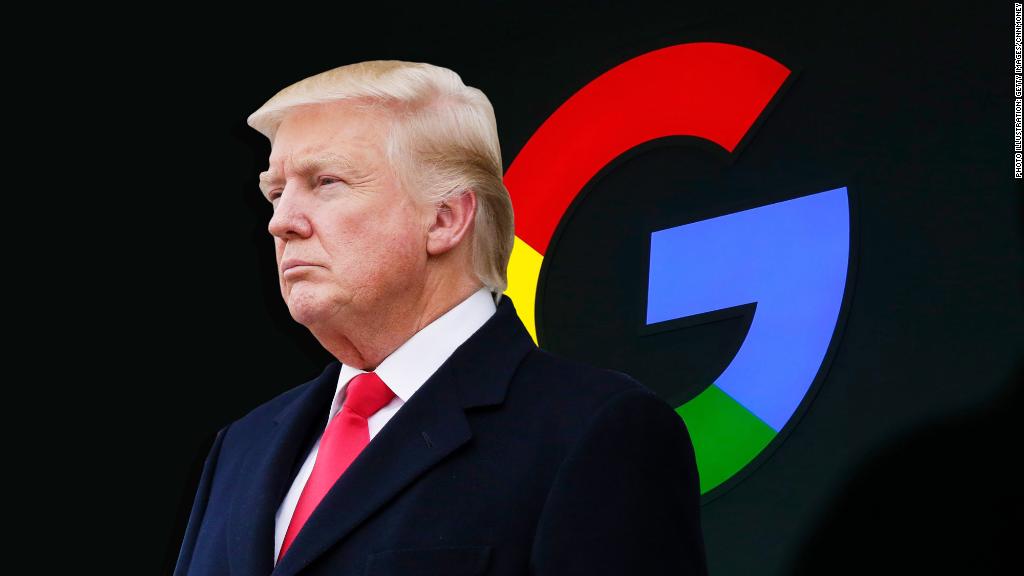
President Donald Trump has renewed his claims of bias against conservatives on the internet, accusing Google of rigging its results to show "bad" stories when users search for "Trump news."
"Google search results for 'Trump News' shows only the viewing/reporting of Fake News Media," the president said Tuesday on Twitter.
"In other words, they have it RIGGED, for me & others, so that almost all stories & news is BAD. Fake CNN is prominent. Republican/Conservative & Fair Media is shut out," he added. "Google & others are suppressing voices of Conservatives."
Trump suggested that Google's actions could be "illegal" and he said that the situation would be addressed. He did not specify what actions he would take, or say what laws may have been violated.
Later in the day, the president reiterated his claims to reporters. Trump, without evidence, accused Google of "taking advantage of a lot of people."
Trump, grouping Google in with Facebook and Twitter, said the tech companies are "treading on very, very troubled territory and they have to be careful."
Google (GOOGL) said its goal with search was to make sure users receive the most relevant answers.
"Search is not used to set a political agenda and we don't bias our results toward any political ideology," a Google spokesperson said. "We continually work to improve Google Search and we never rank search results to manipulate political sentiment."
White House economic adviser Larry Kudlow told reporters at the White House on Tuesday that the administration is "taking a look" at Google search results.
"We're just gonna do some investigations, some analysis, that's what we do," he said.
Pressed on the fact that the theory of censorship had been discredited, Kudlow demurred: "This is above my pay grade."
In addition to routine attacks on broadcasters and newspapers, Trump and some of his supporters have railed against social media and technology companies, claiming that they suppress conservative and pro-Trump information.
Google uses automated programs called "spiders" to search the internet and index pages based on keywords. While search results can vary between users, observers were quick to point out Tuesday that the top result for many "Trump news" searches was an article from Fox News.
According to Google, it uses algorithms to evaluate hundreds of factors including user experience and how many other prominent sites link to a page. It then ranks results by order of usefulness.
It also seeks to identify websites that manipulate its algorithms, and pushes their results down the rankings.
Trump appeared to be referencing a story published in recent days by conservative outlet PJ Media, which claimed that Google was "deprioritizing" content from conservative websites. The story was picked up by other conservative outlets including Breitbart.
Lou Dobbs, a Fox Business Network host and close friend of the president's, highlighted the report on his program on Wednesday.
Google does not reveal the algorithms that power its search engine, or all the factors that go into why one news outlet would rank higher than another in search results. The secretive nature of the algorithms has exposed the company to accusation of bias.
But the articles that were the basis for Trump's claim of rigging ignored the fact that Google's most fundamental interest is returning search results that users find helpful, because that's how it gets them to come back. It does that, in part, by prioritizing results from trusted news outlets with large audiences.
The PJ Media article that led to Trump's claim turned this into a conspiracy in part by defining almost all major national news outlets in the US as on the left, compared to a number of smaller, opinionated and even conspiratorial sites on the right.
The article's author relied on a chart of media outlets made by former CBS News reporter Sharyl Attkisson, who has become a media critic on the right. The chart shows news organizations including ABC News, USA Today, CBS, the Associated Press, CNBC, Bloomberg, CNN, the Washington Post, the New York Times, Time, Politico and even People as being on the left.
The only major national outlets shown as being on the right are the Wall Street Journal, McClatchy, Forbes, The Economist and Fox News. Otherwise, with some exceptions like The Daily Mail and the New York Post, the list of organizations on the right is mostly populated by small outlets that do little original reporting, and even by outright conspiratorial sites like InfoWars and The New American, a site run by the fringe John Birch Society.
The president suggested in a tweet last month that Twitter was "shadow banning" conservatives by making it harder to find some prominent accounts using the search function. Twitter (TWTR) denied the claim.
Allegations of social media bias and censorship have made their way to Congress, where lawmakers have held two hearings this year on the so-called practice of "social media filtering."
Executives from Facebook (FB), Twitter and Google have been asked to testify in front of the Senate Intelligence Committee about censorship and election interference on September 5.
-- CNN's Betsy Klein and Jeremy Diamond contributed to this report from Washington.

